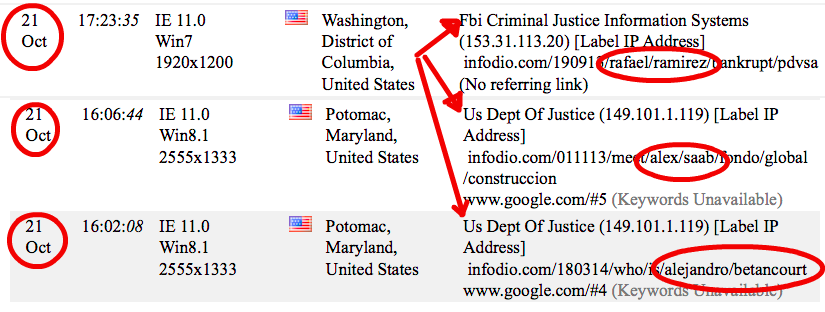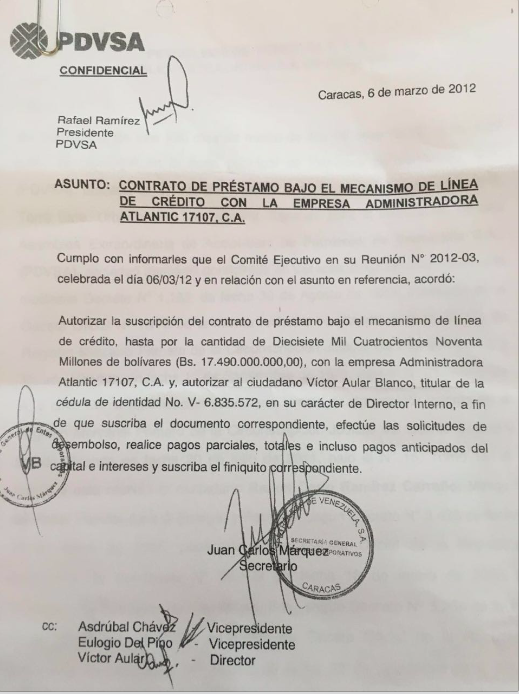
The Wall Street Journal has become about the only outlet that dares exposing Venezuela's monumental corruption. This is not some small-time, FIFA-like scandal, involving a couple hundred million, but gargantuan theft that runs into the tens of billions of dollars. Forget Odebrecht, Petrobras, Peña Nieto's little property deal, or the Kirchners' businesses with Lazaro Báez... South of the Rio Grande, only Venezuela can claim to have reached Olympian heights in the corruption leagues. Venezuela is where grand theft has become institutionalized, and more importantly, perhaps the only country in the region -apart from the Cuban dictatorship- where stealing billions of dollars has no consequences. None.
 Thanks to leaks to this site we can now revisit the latest involving Venezuela's oil giant PDVSA:
Thanks to leaks to this site we can now revisit the latest involving Venezuela's oil giant PDVSA:
1. Juan Andres Wallis, a Caracas lawyer, board member of newspaper El Nacional, controls a company called Atlantic, ultimately owned by Cartera de Activos Cho La Pass 190654 C.A., also under Wallis' control.
2. In January 2012, Atlantic hires Nervis Villalobos as "financial advisor". Villalobos is the go-to guy for the likes of Derwick Associates to obtain billions of dollars worth of no-bid contracts. Villalobos is to be contracted by Atlantic for two years, on a 4% commission of all deals he can generate.
3. On 29 January 2012 Villallobos gets in touch with his mate Rafael Ramirez, at the time both Vzla's Minister of Energy and CEO of PDVSA, with a proposal: Atlantic -let us not forget a shell without track record- is to offer PDVSA a 24-month, "line of credit" worth 17,940 million Bolivares. PDVSA is to pay said "line of credit" to Atlantic in USD at the preferential rate of exchange ($4.17 billion).
4. On 6 March 2012 PDVSA's board (Aular, del Pino and Chavez), approves Atlantic's proposal, and on 12 March 2012 Wallis and Aular put pen to paper.
5. On 15 March 2012 Atlantic cedes 28.5% of its "rights and obligations" to Welka Holding Limited, a Saint Vincent & Grenadines shell registered about a month prior to the deal. Luis Oberto is Welka's controlling party. The $194 million give-away to Welka represents 28.5% of the $680.9 million that Atlantic had already "credited" PDVSA at that time.
6. Also on 15 March 2012, Atlantic gives its remaining "rights and obligations" under the PDVSA-deal to Violet Advisors, a now-defunct Panamanian shell controlled by brothers Ignacio and Luis Oberto.
7. On 16 March 2012, both Welka and Violet send written communication to Rafael Ramirez at PDVSA, to inform about cession agreed with Atlantic. PDVSA is instructed to settle Atlantic's "credit" related payments into Welka's and Violet's bank accounts at EFG Bank and Compagnie Bancaire Helvetique, at the agreed preferential rate of exchange (1BsF=4.3$).
8. On 15 May 2012, Violet undertakes to make a series of payments to Villalobos, as per 4% arrangement with Atlantic. Payments to Villalobos are to be made through Vamshore Enterprises, a company registered by BPA Serveis (a Panamanian subsidiary of Banca Privada D'Andorra or BPA) controlled by Villalobos.
9. On 20 May 2012, Welka undertakes to make payments to Villalobos through Vamshore, as per arrangement with Atlantic.
10. Villalobos' Vamshore account at BPA gets €55.6 million from Welka and Atlantic (about $70 million).
It'd be foolish to think that Wallis just chanced on this deal. As previously pointed, in other guises he shares El Nacional board membership with Ramon Jose Medina (Victor Vargas' legal counsel and top opposition dog), Danilo Diaz Granados (some say Wallis is actually Diaz Granados' proxy there), he also has professional relations or partnerships with Armando Capriles (Nelson Merentes proxy), Carlos Acosta (Juan Carlos Escotet's partner), Luis Carlos Serra Carmona (proxy of disgraced Banco Latino's Gustavo Gomez Lopez), and Luis Emilio Velutini. The first leak to this site about this deal arrived in 2013:
Fearing jail, or vengeance, Oberto Jr was among those who fled. He decamped to a $4.8 million apartment in 255 East 74th St in New York. Sources say that he met Danilo Diaz Granados and Leonardo Gonzalez Dellán in New York. Gonzalez Dellán would provide needed access and contacts to other “bankers” in London. In any case, Oberto Jr came up with a new method to syphon more money out of Venezuela. But he would need new contacts. So he got in touch with Francisco D'Agostino, of Otto Reick v Derwick Associates lawsuit fame (link is external), and asked whether he could pitch his model to PDVSA through Derwick's point man at the State oil company: Nervis Villalobos.
It is not very clear how the whole operation worked, although sources reported as something rather simple: PDVSA assigned dollars to a foreign corporation and people wanting to offload Bolivares and get dollars were offered the scheme. It is alleged that a Panama-vehicle controlled by Oberto Jr (purportedly Violet Advisors (link is external)) was assigned dollars, which were then paid into Violet's account at Compagnie Bancaire Helvetique (CBH), in turn acquired by Danilo Diaz Granados; Victor Vargas (owner of CORP Banca and Banco Occidental de Descuento or BOD) is alleged to have bought into the deal, paying his due in a Banco Industrial de Venezuela bank account belonging to a company called Atlantic. Everyone involved got, of course, their fat commissions.
D'Agostino did not want his father in law (Victor Vargas) to know that he was in the deal with Oberto Jr, and so they decided to offer it through another executive of BOD: Diego Enrique Lepage (link is external), in turn long time friend of Oberto Jr. Once PDVSA had given the green light, and Vargas was on board, Oberto Jr & co moved about $1 billion according to a source familiar with the deal.
The $70 million paid into Villalobos' Vamshore account at BPA could be 4% due on $1.75 billion received by Welka and Atlantic from PDVSA. Without access to PDVSA's accounts is rather difficult to know for certain how much money was siphoned under the scheme. A bit of an explanation about how this get-wealthy-beyond-belief scheme worked would be: a group of Boliburgueses "offer" money to PDVSA, whose CEO Rafael Ramirez, who's also Minister responsible to see that Venezuela's interests in the company are protected, quickly approves; the Boligarch "businessmen" then grab billions of dollars received at preferential rate of exchange ($1=4.3BsF) and doubled the capital by selling in the parallel black market, where each dollar is worth nine Bolivares ($1=9BsF).
In unrelated news, Villalobos is mentioned by Spanish press as having received $50 million from Spanish Duro Felguera in a similar "consulting" services deal. In that particular, Villalobos got his share into accounts belonging to Madeira and U.S. Virgin Islands companies held at BPA's Madrid subsidiary (Banco Madrid). Villalobos also transfered funds into his Royal Bank of Canada accounts in Miami. Ergo Villalobos has set up companies and accounts in a number of jurisdictions, although Andorra's BPA seems to be at the center of his corrupt empire. Interestingly enough, BPA's majority shareholders (Cierco brothers) are meant to be suing U.S. Treasury authorities for having exposed their money laundering racket, and the law firm representing them is none other that Adam Kaufmann's employer.
So Derwick Associates preferred lawyers are also retained by the bankers through whose bank billions of dollars stolen from Venezuela were laundered by one of PDVSA's CEO's preferred operatives (Nervis Villalobos)? Is it not true that Villalobos was also the one who got some PDVSA-contracts for Derwick? And for Duro Felguera?
And then, what role did Diaz Granados play considering his alleged association with Luis Oberto and Charles Henry de Beaumont? What to make of the fact that both sit in El Nacional's board? Wallis is one of some 21 "media executives" banned to leave Venezuela, as per a libel lawsuit filed by narco Diosdado Cabello. With the kind of deals done with Ramirez before getting into trouble with Cabello, Wallis, Oberto et al can well afford to live a golden exile in Miami or New York lasting a lifetime, as they do.

